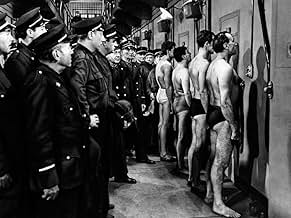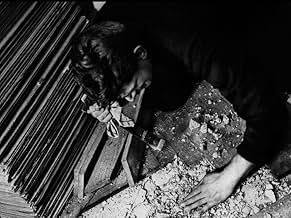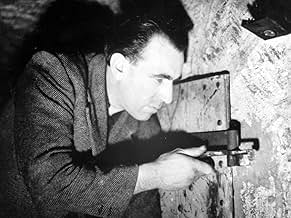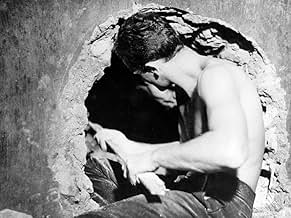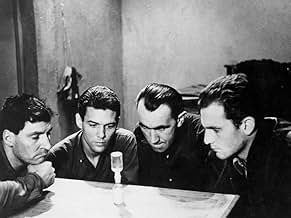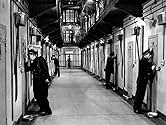Le trou
- 1960
- Tous publics
- 2h 11min
NOTE IMDb
8,5/10
22 k
MA NOTE
Gaspard, récemment incarcéré, est transféré dans une cellule où quatre détenus qui purgent une longue peine prévoient de s'évader en creusant un tunnel.Gaspard, récemment incarcéré, est transféré dans une cellule où quatre détenus qui purgent une longue peine prévoient de s'évader en creusant un tunnel.Gaspard, récemment incarcéré, est transféré dans une cellule où quatre détenus qui purgent une longue peine prévoient de s'évader en creusant un tunnel.
- Réalisation
- Scénario
- Casting principal
- Nomination aux 2 BAFTA Awards
- 2 victoires et 4 nominations au total
Marc Michel
- Claude Gaspard
- (as Mark Michel)
Jean-Paul Coquelin
- Le lieutenant Grinval
- (as J. Paul Coquelin)
Albert Augier
- Un gardien
- (non crédité)
Jean Becker
- Un gardien
- (non crédité)
Mick Besson
- Deuxième plombier
- (non crédité)
Georges Bielec
- Figurant
- (non crédité)
Raymond Bour
- Un gardien
- (non crédité)
Philippe Dumat
- Un gardien
- (non crédité)
Gérard Hernandez
- Le détenu à l'infirmerie
- (non crédité)
Jean Luisi
- Un détenu
- (non crédité)
Avis à la une
Immediate background:Jacques Becker was dying when he filmed "le trou,and he made it his legacy;it's the tragedy of man caught on the web of life -an admirable metaphor shows two wardens feeding a spider in the undergrounds with a fly-,and anyway unable to escape from the final death.
The first thing to bear is mind is that,calling "le trou" a "prison movie" would be an insult.Although adapted from a Jose Giovanni's book -Giovanni had been himself in jail for some time and his depictions are as close to reality as can be-,Becker masterfully transcends his subject and gives something definitely new.Some said it was the final link between "la nouvelle vague" and what the highbrows pejoratively -and thoroughly unfairly- call "cinema de qualité" but Becker had predated that overrated new wave by almost ten years :"rendez-vous de juillet" had already almost everything the young Turks would bring later.
First shock is the use of the wide screen,the cinemascope,which Becker had never experimented before;and he achieved the impossible: using this device for a story which takes place ,either in the four walls of a jail,or in the undergrounds and the sewers .The only picture of the outside is seen when the two inmates open a manhole.And the second one is the sound:there's no music at all,except for the final cast and credits -saving the cast and credits for the end was very rare in the contemporary French cinema -But the soundtrack resembles some kind of musique concrete with its relentless thumps, the whispers and the screams inside the cell,the creaking of the doors ,the waters in the sewer;and the final cacophony -which is not unlike the one which Manliewicz used in "suddenly last Summer" the year before- packs a real wallop.
Another Becker's tour de force is his description of the prison life:he avoids all the clichés that mar so many "prison movies" (the overpraised "Whatsisname redemption" is no exception):here, the wardens are,most of the time ,kind and friendly,the relationships with the inmates remain polite ,maybe sometimes too much:particularly those between the young man (Marc Michel) and the head warden are almost paternalistic.
Another Becker's permanent feature comes back to the fore in "le trou" :friendship,solidarity ,which was already present in "rendez-vous de juillet" and "touchez pas au grisbi".Here it's pure manly friendship and it seems that a certain misogyny is infiltrating Becker's world:during the 2 hours + running time of the movie,we only see one young girl (Catherine Spaak) behind a grille,for a very short while.The only positive woman whom we' ll never see is (naturally) one of the five inmates ' s(Michel Constantin) mother("I almost killed her when I was sent to jail so I do not want to take a chance and try to escape")
SPOILER:But even this world where five inmates share everything,where their friendship is "more than I 've ever had "(Marc Michel's character) is collapsing;the first cracks were already here in "rendez-vous de juillet" when some of the young students were giving up on their plans ,to the main hero's (Daniel Gelin)disappointment.But "touchez pas au grisbi" took friendship over everything including money."Le trou" reveals the true nature of man,even if the informer seems completely desperate at the end of the movie.The mammoth task they did ,the hole '(le trou) is nothing but a cul-de -sac and it epitomizes,in a Hustonian way -we're closer to Huston than to Godard ,fortunately,the vanity of everything man can do to escape from his fate,and in the case of Becker ,to escape from death.END OF SPOILER
Had Becker ended his career with his three precedent movies (Ali-Baba,Arsène Lupin ,Montparnasse 19),his former masterpieces (Casque d'or,Goupi Main Rouges ,rendez-vous de juillet),could have been tarnished by association.But "Le trou" ,his final masterpiece stands in little danger of bringing this about.
The first thing to bear is mind is that,calling "le trou" a "prison movie" would be an insult.Although adapted from a Jose Giovanni's book -Giovanni had been himself in jail for some time and his depictions are as close to reality as can be-,Becker masterfully transcends his subject and gives something definitely new.Some said it was the final link between "la nouvelle vague" and what the highbrows pejoratively -and thoroughly unfairly- call "cinema de qualité" but Becker had predated that overrated new wave by almost ten years :"rendez-vous de juillet" had already almost everything the young Turks would bring later.
First shock is the use of the wide screen,the cinemascope,which Becker had never experimented before;and he achieved the impossible: using this device for a story which takes place ,either in the four walls of a jail,or in the undergrounds and the sewers .The only picture of the outside is seen when the two inmates open a manhole.And the second one is the sound:there's no music at all,except for the final cast and credits -saving the cast and credits for the end was very rare in the contemporary French cinema -But the soundtrack resembles some kind of musique concrete with its relentless thumps, the whispers and the screams inside the cell,the creaking of the doors ,the waters in the sewer;and the final cacophony -which is not unlike the one which Manliewicz used in "suddenly last Summer" the year before- packs a real wallop.
Another Becker's tour de force is his description of the prison life:he avoids all the clichés that mar so many "prison movies" (the overpraised "Whatsisname redemption" is no exception):here, the wardens are,most of the time ,kind and friendly,the relationships with the inmates remain polite ,maybe sometimes too much:particularly those between the young man (Marc Michel) and the head warden are almost paternalistic.
Another Becker's permanent feature comes back to the fore in "le trou" :friendship,solidarity ,which was already present in "rendez-vous de juillet" and "touchez pas au grisbi".Here it's pure manly friendship and it seems that a certain misogyny is infiltrating Becker's world:during the 2 hours + running time of the movie,we only see one young girl (Catherine Spaak) behind a grille,for a very short while.The only positive woman whom we' ll never see is (naturally) one of the five inmates ' s(Michel Constantin) mother("I almost killed her when I was sent to jail so I do not want to take a chance and try to escape")
SPOILER:But even this world where five inmates share everything,where their friendship is "more than I 've ever had "(Marc Michel's character) is collapsing;the first cracks were already here in "rendez-vous de juillet" when some of the young students were giving up on their plans ,to the main hero's (Daniel Gelin)disappointment.But "touchez pas au grisbi" took friendship over everything including money."Le trou" reveals the true nature of man,even if the informer seems completely desperate at the end of the movie.The mammoth task they did ,the hole '(le trou) is nothing but a cul-de -sac and it epitomizes,in a Hustonian way -we're closer to Huston than to Godard ,fortunately,the vanity of everything man can do to escape from his fate,and in the case of Becker ,to escape from death.END OF SPOILER
Had Becker ended his career with his three precedent movies (Ali-Baba,Arsène Lupin ,Montparnasse 19),his former masterpieces (Casque d'or,Goupi Main Rouges ,rendez-vous de juillet),could have been tarnished by association.But "Le trou" ,his final masterpiece stands in little danger of bringing this about.
Le Trou played on TV the other night, and thus gives me a chance to evaluate it after 20 years or so. The direction is magnificent: Becker was a genius at refining the elements of the story down to a bare minimum. Space is used well; the close-ups of men banging on concrete with improvised tools in a cramped space are very effective, they look like burrowing animals. Ghislain Cloquet was a master of black-and-white camerawork; he shot Mouchette and Au hasard, Balthazar for Bresson, Nuit et brouillard for Resnais, Le Feu follet for Malle, all great films made greater by Cloquet's work.
The endless dull routine enlivened by subterfuge--stealing materials needed for digging and making puppets to stand in for sleeping prisoners is brilliantly captured. If the prisoners are bored, so are the staff--the warden is desperate for some conversation with Gaspard, or with anybody. Geo's problem is a little hard to understand, I thought he'd want to go through with the plan. Otherwise I rate it very highly indeed.
The endless dull routine enlivened by subterfuge--stealing materials needed for digging and making puppets to stand in for sleeping prisoners is brilliantly captured. If the prisoners are bored, so are the staff--the warden is desperate for some conversation with Gaspard, or with anybody. Geo's problem is a little hard to understand, I thought he'd want to go through with the plan. Otherwise I rate it very highly indeed.
Jacques Becker's "Le Trou" is one of the greatest of all prison-break films. No film lover should miss it. It is every bit as masterful and tense as other milestones of this subgenre, including John Sturges' "The Great Escape," Robert Bresson's masterpiece "A Man Escaped," and Don Siegel's "Escape from Alcatraz." The meticulous preparation for the escape is a nail-biter, with many adrenaline-inducing close calls. The ringer: Will the newly exonerated prisoner stay with the group and escape or rat on the others? Those seeking pure entertainment or those seeking existentialist philosophical fare will be equally pleased. A memorable movie experience.
Jacques Becker's swan song is a real gem of a film. Le Trou has such an amazing kinetic rhythm to it that one both feels and forgets the claustrophobic environs. Based on a real story turned into a novel by one of the "escapees", the film has excellent casting, wonderful (candel-lit!) cinematography and crisp dialog among its other advantages.
The director was terminally ill during the shoot and was to die after making the final cut. Watching this classic now some four decades since auteur's death, one can only wonder what an artist it would take to demand and achieve such breathtaking perfection in art while combating death at the same time.
Do not let yourself be put off by "yet another prison-movie!" talk. It is too good to be just that. So much so that it could merit comparison with Bresson's "A Man Escaped". A very deserving 10 out of 10.
The director was terminally ill during the shoot and was to die after making the final cut. Watching this classic now some four decades since auteur's death, one can only wonder what an artist it would take to demand and achieve such breathtaking perfection in art while combating death at the same time.
Do not let yourself be put off by "yet another prison-movie!" talk. It is too good to be just that. So much so that it could merit comparison with Bresson's "A Man Escaped". A very deserving 10 out of 10.
This most powerful of escape stories is a wonderful exposition of the most basic human qualities, ingenuity and cooperation, and the innate drive toward freedom that brings these qualities into being.
While the theme of transcendence is certainly present (although not be-labored) as in A MAN ESCAPED, it is interesting that, in direct contrast to Bresson's work, transcendence is here achieved through work WITH others on a task. The inmates form a unique brotherhood through their joint reliance. This allows them to be IN the prison while not OF it and is quietly visible from the early moments of the film. We see this group bond deepened through each risk taken, each chisel blow against a concrete wall, and we become emotionally tied to the characters' quest simply through observing their effort (it is amazing how dramatic hammering away at a concrete wall can be). No verbal exposition is necessary, no creation of characters and their pasts intrudes to distract us from their task, which IS the drama.
Indeed Becker's film is as notable for what is left out as for what is included. There are no prison "types" created, his style is restrained to the point of being transparent, not to the point of calling attention to itself as "bare" or "ascetic" as Bresson's is. We get no exposition of the horrors of prison life; just enough detailing of the regimentation, drabness of environment, and lack of personal space to make us aware of the institution's suffocating presence. There are no sudden surprises or plot shifts. Well, maybe one. The shot in the mirror near the end of the film is so surprising that I literally couldn't take it in for a few seconds, I thought it had to be a dream: that's how involved with the characters I was! Finally, there is no use of music to pump up the suspense. There IS, however, a powerful and unique use of sound. We hear, in an almost hallucinatory fashion, every thump, clang, and wail within the prison walls and, during the digging scenes, Becker apparently uses a dual soundtrack combining naturalistic sound with heightened effects of the digger's grunts, heavy breathing, and THUMPS of metal against rock. Again this serves to effectively involve us with physical/emotional effort of their task. The cacophony the end of the film harshly accents our sense of disturbance and loss.
It is also worth noting that the apparent "innocent" in the film is the only one who does not achieve transcendence. While he may legitimately gain his freedom, he remains locked within the bounds of his own ego ("poor Pierre" says the leader of the break). Another interesting contrast (reply?) to Bresson.
Altogether a powerful statement that humans at work can be intrinsically dramatic subject matter, that the most simple of subjects can be the most visually entrancing (and emotionally resonant) and a grand illustration of the maxim that "God (and/or art) is in the details". 10/10
While the theme of transcendence is certainly present (although not be-labored) as in A MAN ESCAPED, it is interesting that, in direct contrast to Bresson's work, transcendence is here achieved through work WITH others on a task. The inmates form a unique brotherhood through their joint reliance. This allows them to be IN the prison while not OF it and is quietly visible from the early moments of the film. We see this group bond deepened through each risk taken, each chisel blow against a concrete wall, and we become emotionally tied to the characters' quest simply through observing their effort (it is amazing how dramatic hammering away at a concrete wall can be). No verbal exposition is necessary, no creation of characters and their pasts intrudes to distract us from their task, which IS the drama.
Indeed Becker's film is as notable for what is left out as for what is included. There are no prison "types" created, his style is restrained to the point of being transparent, not to the point of calling attention to itself as "bare" or "ascetic" as Bresson's is. We get no exposition of the horrors of prison life; just enough detailing of the regimentation, drabness of environment, and lack of personal space to make us aware of the institution's suffocating presence. There are no sudden surprises or plot shifts. Well, maybe one. The shot in the mirror near the end of the film is so surprising that I literally couldn't take it in for a few seconds, I thought it had to be a dream: that's how involved with the characters I was! Finally, there is no use of music to pump up the suspense. There IS, however, a powerful and unique use of sound. We hear, in an almost hallucinatory fashion, every thump, clang, and wail within the prison walls and, during the digging scenes, Becker apparently uses a dual soundtrack combining naturalistic sound with heightened effects of the digger's grunts, heavy breathing, and THUMPS of metal against rock. Again this serves to effectively involve us with physical/emotional effort of their task. The cacophony the end of the film harshly accents our sense of disturbance and loss.
It is also worth noting that the apparent "innocent" in the film is the only one who does not achieve transcendence. While he may legitimately gain his freedom, he remains locked within the bounds of his own ego ("poor Pierre" says the leader of the break). Another interesting contrast (reply?) to Bresson.
Altogether a powerful statement that humans at work can be intrinsically dramatic subject matter, that the most simple of subjects can be the most visually entrancing (and emotionally resonant) and a grand illustration of the maxim that "God (and/or art) is in the details". 10/10
Le saviez-vous
- AnecdotesThe scene where three different characters take turns breaking through the concrete floor of their cell is filmed in a single, nearly four minute long, shot.
- GaffesWhen Geo checks the corridor with the mirror and takes a break to say goodbye to his cellmates, he leaves the mirror in the hole. However, when he goes back to checking the corridor he has to stick the mirror back into the hole first.
- Citations
[last lines]
Roland Darban: [stripped, facing the wall under guard] Poor Gaspard.
- ConnexionsFeatured in Mon père, il m'a sauvé la vie (2001)
Meilleurs choix
Connectez-vous pour évaluer et suivre la liste de favoris afin de recevoir des recommandations personnalisées
- How long is The Hole?Alimenté par Alexa
Détails
Box-office
- Montant brut aux États-Unis et au Canada
- 34 588 $US
- Week-end de sortie aux États-Unis et au Canada
- 6 756 $US
- 2 juil. 2017
- Montant brut mondial
- 34 588 $US
- Durée2 heures 11 minutes
- Couleur
- Rapport de forme
- 1.66 : 1
Contribuer à cette page
Suggérer une modification ou ajouter du contenu manquant



